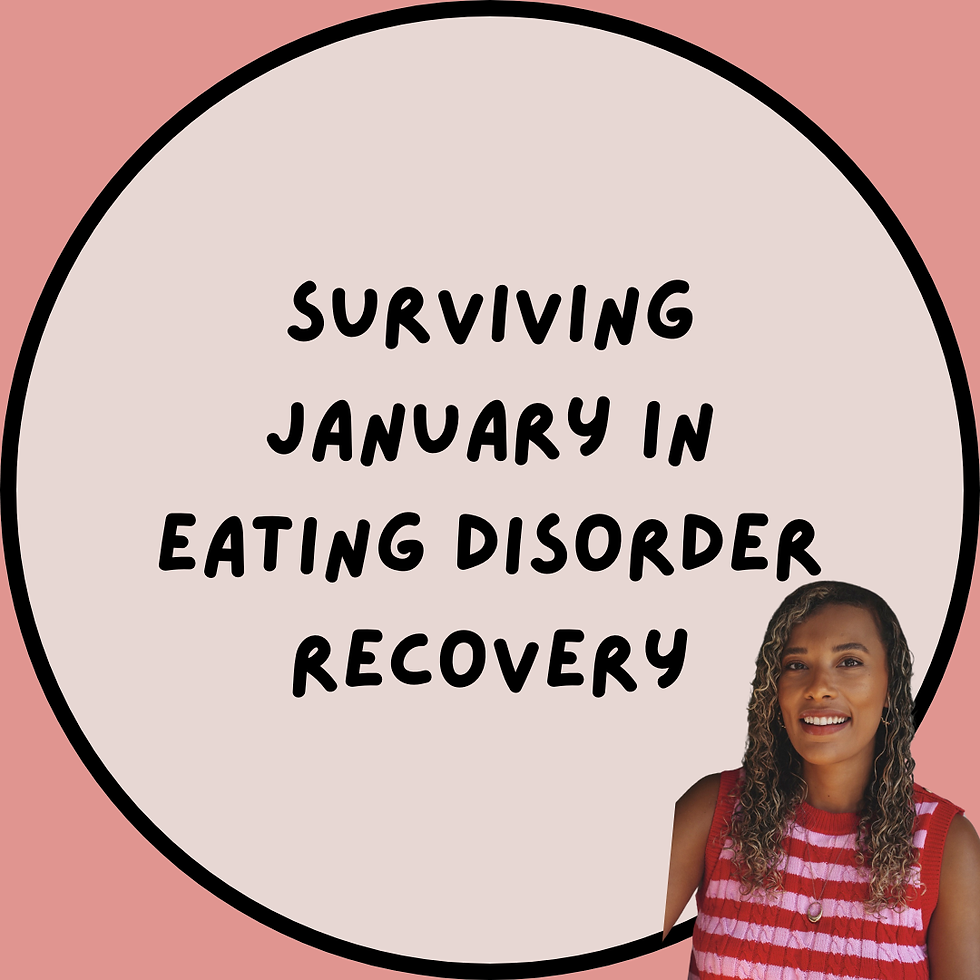Ambivalence and Eating Disorder Recovery
- Beth Francois

- Jun 1, 2025
- 4 min read
Ambivalence is a common (and often misunderstood) part of the recovery process from an eating disorder. By definition, ambivalence means experiencing simultaneous and conflicting feelings about something. This can look like having both positive and negative feelings at the same time, making it difficult to form a clear opinion or make a decision. For someone struggling with an eating disorder, this might be desperately wanting to recover while also feeling terrified of what this process entails.
Why Does Ambivalence Show Up in Eating Disorder Recovery?
Eating disorders are largely Ego-Syntonic
Eating disorders, particularly anorexia nervosa, are often ego-syntonic, meaning the individual perceives the behaviours as valuable or necessary. A 2017 systematic review found that many individuals with anorexia saw their disorder as a source of:
Stability and safety
Emotional avoidance
Increased confidence
Social validation
Communication
A sense of mastery and control
Magical Thinking
Many individuals believe that without their rules and safety behaviours, something bad will happen. These fears might not seem rational from the outside, but they feel very real to the person living with the disorder.
No crystal ball to see the future
Even when clients hear stories of recovery or receive reassurance, they often struggle to believe change is possible for them or that a recovered life would be better. Experiencing small benefits from recovery first-hand is often necessary before someone can begin to trust the process.
Lack of Trust
Clients often trust their eating disorder more than they trust their care team – especially early on. This may stem from unfamiliarity with the clinician or previous negative experiences in treatment.
Cognitive Impairment
Nutritional deficits, especially in those at low weights or with significant weight loss, can impair cognitive flexibility and long-term thinking. Clients may fixate on moment-to-moment decisions, with an inability to consider broader goals.
Fear of Weight Change
This may be connected to a fear of:
Losing control
Being judged
Losing identity
Re-triggering trauma
Society’s fatphobia and diet culture only intensify these fears, making recovery feel even riskier.
Fear of Failure
Clients who have attempted recovery before and relapsed may doubt their ability to recover again. This can lead to catastrophising thoughts like, “I’ll never get better.”
How to Work with Ambivalence
Motivational Interviewing (MI)
MI is a collaborative, respectful, and non-judgemental communication style that helps clients explore their own reasons for change. Key principles include:
Evocation: Believing that clients already have the wisdom they need inside them.
Autonomy: Respecting the client’s right to choose – or not choose – to change.
Collaboration: Working with the client as equals, not directing or instructing.
Examples of MI techniques include:
OARS: Open questions, Affirmations, Reflections, Summaries
DEARS: Develop discrepancy, Express empathy, Amplify ambivalence, Roll with resistance, Support self-efficacy
Considering the Stages of Change
Understanding where a client is, in the Stages of Change Model can guide our approach:
Pre-contemplation: Build rapport, reduce pressure, explain rationale without overwhelming.
Contemplation: Explore fears, highlight internal conflict, help client visualise life beyond the eating disorder.
Preparation: Map out next steps and goals collaboratively.
Action: Encourage reflection on progress, support goal-setting.
Maintenance: Build relapse prevention strategies.
Relapse: Normalise setbacks, identify learnings, maintain hope.
Building Therapeutic Rapport
Rapport can be the turning point for many ambivalent clients. Key elements include:
Validation: Acknowledge fears before challenging them.
Reliability: Do what you say you’ll do – consistency builds trust.
Non-judgement: Respond neutrally to shame-inducing disclosures.
Explanation: Always explain the “why” behind decisions.
Personal Connection: Get to know the client beyond their eating disorder.
Boundaries: Provide structure, containment, and clarity.
Clear Expectations: Be upfront about what you can and cannot support
Addressing Ambivalence Directly
Rather than tiptoeing around resistance, name it:
“What keeps you coming back even though recovery feels so hard right now?”
“I notice we’re feeling a bit stuck – what’s that like for you?
Gently explore:
Whether their recovery plan feels too fast or overwhelming.
If their current actions are aligned with their priorities.
Whether they can still take steps forward while feeling ambivalent.
Using Visual Tools
Reflection and creativity can be powerful:
Pros and cons worksheets
Comfort zone mapping
Values alignment exercises
Recovery vision boards
SMART goal setting
Journaling prompts around meaning and purpose
These tools help clients externalise their thoughts and gain clarity on what they want and what’s holding them back.
Integrating Family and Carers
When ambivalence is high, family and carer involvement can be helpful:
Joint sessions help build alignment and reduce guilt.
Clarify support roles and boundaries
Manage splitting by keeping communication consistent.
Provide psychoeducation and support groups to bridge understanding.
Equip carers with meal support strategies and communication tools.
Avoid secret-keeping – transparency fosters trust, even when it’s hard.
Final Thoughts
Ambivalence isn’t a barrier to recovery, it’s part of it. Acknowledging, understanding, and working with ambivalence allows us to meet clients where they are and support them in moving forward, even when they’re unsure. With compassion, clarity, and collaboration, we can help clients hold both hope and fear, and take steps anyway.
References
Gregertsen, E.C., Mandy, W. and Serpell, L. (2017) ‘The egosyntonic nature of anorexia: An impediment to recovery in anorexia nervosa treatment’, Frontiers in Psychology, 8.
Lavender, A. et al. (2006) ‘Obsessive‐compulsive beliefs and magical ideation in eating disorders’, British Journal of Clinical Psychology, 45(3), pp. 331–342.
Lev Ari, H.S. et al. (2023) ‘Facilitators and obstacles to therapeutic alliance among patients with anorexia nervosa: A qualitative dyadic research’, Counselling and Psychotherapy Research, 24(1), pp. 136–153.
Miller, W.R. and Rollnick, S. (2023) Motivational interviewing: Helping people change and grow. New York, NY: The Guilford Press.

_edited.png)



Comments